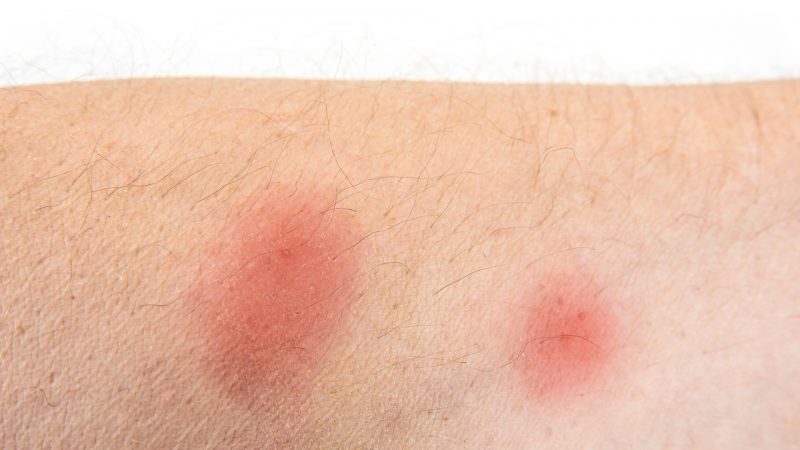How come we never see bed bugs feeding on us, yet we later see the red spots on our skin? That’s because bed bugs love a peaceful and quiet environment and they use that period to feed.
How often do bed bugs feed? Bed bugs will feed approximately once every 5 to 10 days or once per week. They can endure for more than a year if the weather is cooler. They won’t likely live at room temperature for more than three months, though.
In this article, we’re going to go through some of the eating habits of bed bugs. Let’s start!
How the Bed Bugs Extract Blood?
Since bed bugs don’t have teeth, they don’t actually bite you. Biting is something that cockroaches do. Cockroaches can also bite your furniture and make new ways to pass through your house. Unlike cockroaches, bed bugs use a straw instead of a mouth to drink blood, similar to mosquitos.
The mosquito uses a straw that extends from its body. The straw is so thin that you barely feel the bite and the blood starts to circulate through the straw until the mosquito is full. Sometimes, you can feel the bite but it’s already too late because the mosquito finished his meal.
The same thing happens with bed bugs. Since bed bugs are much smaller, you’re not going to feel the bite. They use the straw to draw blood from you and after that, they leave. The bed bug feeding can last for a couple of minutes, so it’s not just a quick bite. Unfortunately, we are vulnerable at night when sleeping, so bed bugs have a lot more than 5 minutes to do their job.
What are the Typical Bed Bug Feeding Times?

Although bed bugs typically feed at night or when you sleep, people with bed bug infestation said that it’s not always the case. Bed bugs can also feed while you’re watching TV and you won’t even notice it!
Let’s say you are watching a game of your favorite team on TV. If you’re like most people, you’re probably laying in your bed similarly to how you lay when you’re sleeping. For bed bugs, this is also a calm state, so they can go out of their shelter for a few drops of blood. Since the bites are so small that you can’t feel them, bed bugs will attach themselves, get their meal, and return to the shelter.
On the brighter side, you don’t have to be paranoid about getting bitten by bed bugs during the day. In a vast majority of cases, you’ll only get bed bug bites during the night, especially if you’re a busy person and sleep only at night.
We understand that knowledge of bed bug infestation in your house is a terrible thing but being paranoid isn’t going to kill bed bugs. On the brighter side, bed bugs can’t carry any deadly diseases from their bites, but this is not the case with their feces.
How Long Can Bed Bugs Survive Without Food?
If we could vote for the most durable insects on the planet, bed bugs would probably be in the top 5. Bed bugs exist for hundreds of years and their fight for existence made them evolve into ultimate blood-sucking machines. Given the fact that they feed once per week on average, could bed bugs survive a month or two without food?
Unfortunately, they can survive much more than that. On average, bed bugs can endure up to six months to a year without a single drop of blood! I know that’s insane but that’s how it is. Of course, we need to take some factors into account like the room temperature.
In very cold or very hot environments, bed bugs can’t survive up to one year without blood. The higher the temperature, the shorter their lifespan without food is. Unfortunately for us, temperatures that can kill bed bugs are very, very high or low, so even if your house is a bit colder or a bit hotter, bed bugs can still go up to one year without drinking blood.
Is a Bed Bug Bite Painful?

The moment bed bugs start biting you, you won’t feel anything, as bed bug bites aren’t painful. This is why many people fail to detect the early stages of bed bug infestation, while it’s still not that prominent. The trick is that the bed bug bites start to itch after one or two weeks, which depends on the individual.
Some people can feel the itch after one week, whereas others won’t feel anything and will only see the bites. Either way, bed bug bites take a bit of time to start developing into tiny red spots on your skin that can spread anywhere, depending on the location where the bed bug has bitten you.
The gross thing about bed bugs is that they can bite you wherever they want, with no typical spots. For example, mosquitos often bite you around your wrists, joints, and ankles. You’ll rarely have a mosquito bite you on your butt or cheeks.
On the flip side, bed bugs bite the part of your body that’s closest to the bed. If that is your head, they’ll go for the head and you’ll see bed bug bites on your cheeks, forehead, nose, etc. Although people get bitten mostly around the arms, shoulders, and stomach, bed bugs can bite you anywhere, so there are no rules.
Why Bed Bugs Don’t Drink Blood Frequently?
Simply put, bed bugs don’t need to drink blood frequently. The blood that they drink is used only for useful processes, such as passing through the necessary life cycles, as well as mating, and giving birth.
The first three distinct life stages are eggs, nymphs, and adults. A blood meal per phase is necessary to advance to the next phase. Given that there are five nymphal phases before getting to the adult phase, bed bugs need more than 5 meals to become adults. When they become adults, male bed bugs need your blood for impregnating female bed bugs, which then need blood for producing healthy eggs.
At room temperature, bed bugs usually need four to five weeks to complete the life cycle, which is logical, given that they feed approximately once a week – sometimes less, sometimes more. The information we gave above about bed bugs surviving up to a year without food, applies only to adult bed bugs, e.g. the bed bugs that have completed their life cycle.
Cooler temperatures make them live longer without food. Also, we need to mention the frequency of feeding of bed bug nymphs. Bed bug nymphs need a minimum of five blood meals to become adults.
Do Female Bed Bugs Eat More Frequently than Males and Vice Versa?
There isn’t any scientific proof that one gender of bed bug eats more than others. The reason is that both of them equally need blood. While male bed bugs don’t give birth, they need to feed to be able to impregnate female bed bugs.
On the contrary, female bed bugs can’t give birth without the required nutrients, which is the case for any living being. If a pregnant bed bug doesn’t drink enough blood, the egg quality will be lower and new bed bugs will probably not be able to grow up.
List of Sources
Ashbrook, A. R., et al. (2019). Bed Bug Control: Heat and Cold. The Ohio State University.
Miller, D. M., Polanco, A., Rogers, J. (2013). Bed Bug Biology and Behavior. Virginia Cooperative Extension.
Vail, K., Barnwell, P. (2016). Bed Bugs Management and Prevention. University of Tennessee Extension.
- How to Get Rid of Copperheads | Practical Guide - August 27, 2023
- How to Get Rid of Corn Snakes | What Makes Them Aggressive? - August 27, 2023
- How to Get Rid of Alligators | Safety Measures and Removal Methods - July 16, 2023
